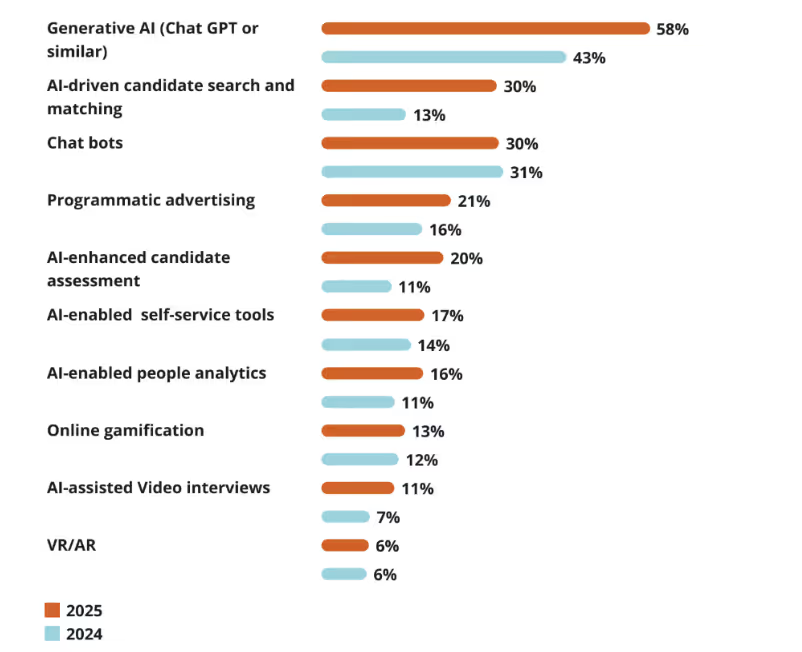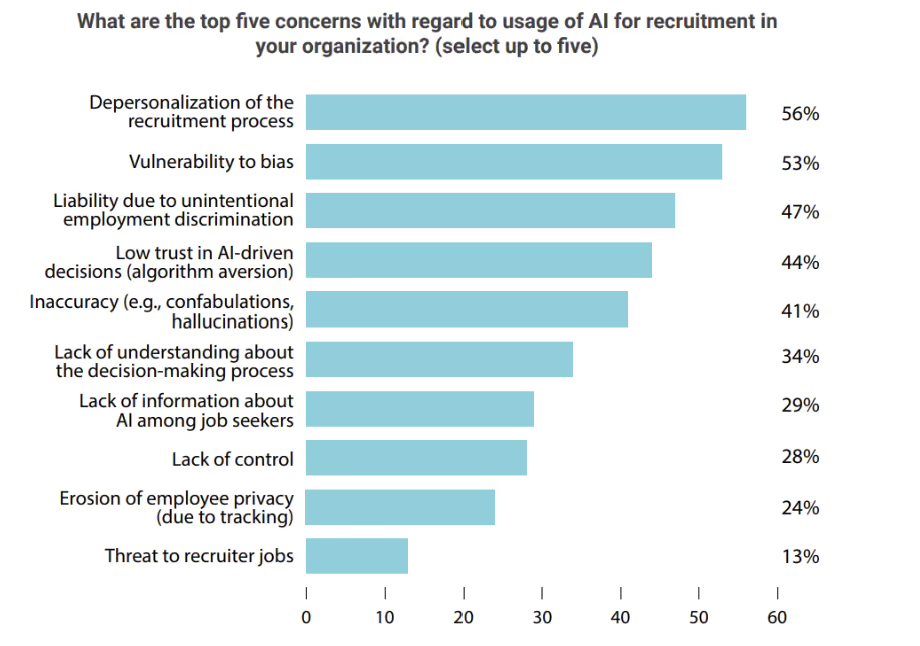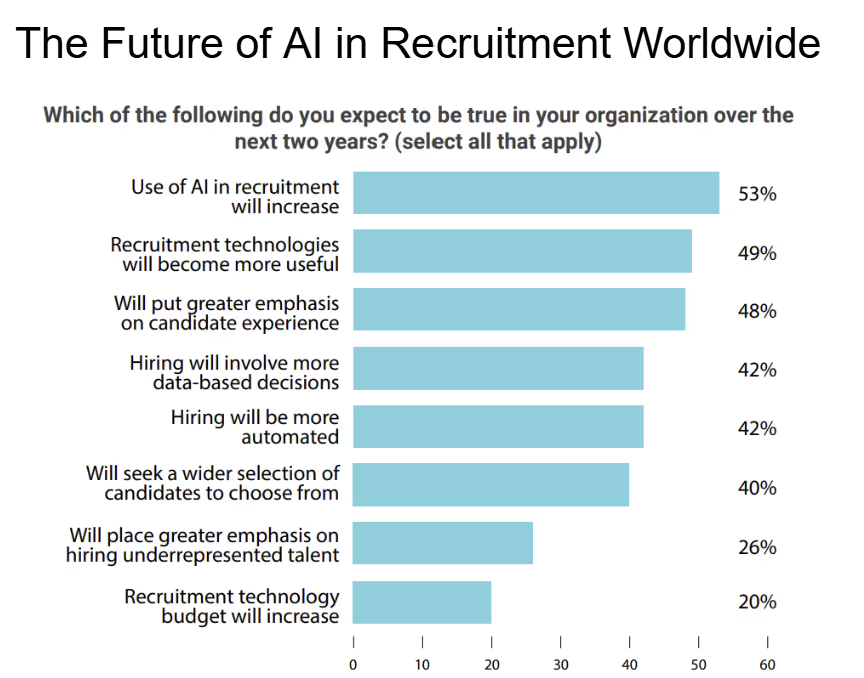AI was named the #1 trend in talent acquisition for 2025, with 84% of HR professionals planning to use it in their recruitment efforts.
AI hiring tools are already supercharging recruitment — through rapid applicant screening, more efficient admin and candidate predictive analysis.
As AI shakes up the recruitment landscape, it’s worth understanding the best use cases of AI in HR. Here we’ll explore how AI in recruitment is used today, including main advantages, challenges and trends so your business can strike the ideal balance between human judgment and machine intelligence.
What Is AI in Recruitment?
90% of companies already use some level of automation in recruitment, typically through an ATS (Applicant Tracking System) such as BambooHR, Zoho Recruit, Lever or more.
So how does AI stand out from traditional tracking software?
ATSs are great for managing candidate stages and recruitment workflows. They also include some basic candidate filtering based on keywords.
Yet, AI in recruitment goes far beyond the scope of tracking software, especially through its capabilities for automation and analysis.
Features of AI in Recruitment for U.S. Companies

AI in recruitment is focused on administrative automation, deeper analysis of candidates and forecasting job success. Key features in high demand with AI recruiters include:
- Streamlining candidate outreach on relevant sites and social media networks
- Screening resumes and applications (not just keywords but via contextual information)
- Automating administrative tasks (e.g. scheduling interviews, filling out paperwork, etc.)
- Auto-communicating with candidates (e.g. job descriptions, emails, company videos, etc.)
- Assessing skills and background (e.g. AI video interviews, tailored skill tests, etc.)
- Forecasting job success metrics (e.g. performance, cultural fit, aligned pay expectations)
Overall, AI recruitment software is driven by data — both in analyzing and predicting the best candidates for the job. It also gives recruiters access to the full candidate pipeline to better optimize each touchpoint. Most importantly, it frees HR professionals to handle strategy and relationship building.
Find out how AI is redefining hiring today with this recent Forbes leadership article.
Key Benefits of AI in Recruitment for LatAm and Beyond
“1 in 3 businesses believe AI will lead their hiring process by 2026.” (HR Dive)
AI is a game-changer for many areas of recruitment — whether to boost efficiency, candidate experience or cost savings. Most importantly, 74% of recruiters have said AI improves the quality of hires.
Highly Efficient Sourcing and Screening
89% of HR professionals report that using AI for recruitment activities improves their efficiency. Overall, AI can help you reach a wider talent pool and screen larger application volumes. It also accelerates recruitment cycles, trimming hiring time by 50%.
Data-Driven Decision-Making
AI in recruitment identifies the most qualified candidates using skill and performance data. As a result, 24% of recruiters report that AI has helped identify top candidates. In addition to candidate screening, AI can analyze and glean insights into a variety of metrics aimed at making data-backed decisions.
Better Candidate Experience Via AI
Efficiency is often cited with AI, but quality is another key factor. Candidates can enjoy
smoother experiences through personalized, 24/7 communication. In fact, faster response times was the most cited benefit of AI for candidates. Recruiters who use AI also can offload admin and dedicate more time towards relationship building.
Bias-Free Hiring
Unconscious bias is a known problem in recruitment. Yet, AI – when properly trained – can minimize these biased patterns. Models that are thoughtfully designed and implemented can minimize human bias by focusing on candidate skills over other traits.
The key here is proper training. Otherwise AI models will simply reflect biased human mindsets. Take for example that Amazon scrapped their recruitment platform because the AI was biased against women.
Cost Savings
AI in recruitment can elevate cost savings by up to 30%, with some businesses reporting 50%. Savings tend to come from greater efficiencies and shorter recruitment cycles. For example, 86% of recruiters using AI reported faster hiring processes. (Plus, choosing to hire developers in LatAm can reduce your overall salary budget!)
Real-World AI in Recruitment Use Cases and Tools

Top brands are harnessing AI for diverse recruitment tasks such as candidate sourcing, assessment, communication and beyond.
Recruiters are especially keen to use AI to generate recruitment materials (58%). They’re also leveraging it for streamlining the search process (30%) and providing chatbots for candidates (30%). For example:
- Chipotle Mexican Grill uses an AI assistant to boost application completion rates and rapidly fill seasonal roles.
- Siemens AG identifies top candidates through an AI algorithm that analyzes profiles, resumes and skills.
- Unilever uses AI-powered video interviews and skills assessments to discover best-fit candidates.
- Delta Air Lines built an AI chatbot to handle applicant questions and feedback to strengthen candidate experience.
AI Hiring Tools for U.S. Companies
Businesses today don’t have to build their own AI tools – though AI software development is a great option for some. Platforms such as HireVue, Pymetrics and Eightfold AI can be integrated into your current HR recruitment processes to expand efforts at scale.
Overall, these AI hiring tools focus on AI-powered video interviews, virtual job try-outs, soft skill assessments and automated candidate engagement. Some also include features to enhance your current HR workflow capabilities.
AI for Tech Hiring in LatAm
Assessing candidate technical skills has always been tricky for companies without the in-house expertise. It’s now even harder to evaluate real capabilities, as developers lean on AI coding tools in their processes.
In response, companies are leveling up their technical and coding assessments to hire AI developers, such as:
- Using testing platforms such as HackerRank to track how developers use AI, offering a more transparent view into real skills.
- Personalizing coding tests with AI to match the job description and in-demand skills.
- Undergoing AI-powered “collaborative coding” assessments to see how developers work together.
- Generating AI summaries of candidate GitHub data and project portfolios to better understand their backgrounds.
No matter how you choose to evaluate technical candidates, it’s essential to have human experts check the results and ask follow-up questions. Learn how our Tecla specialists screen our elite talent and find top AI developers.
Delve into SHRM’s AI in HR trends report for 2025 to get the latest in tech hiring.
Ethical and Technical Challenges of AI in Recruitment

67% of job seekers are uncomfortable with businesses using AI in recruitment. The main worries are that it will “shut them out” of opportunities and/or expose their private data.
As you integrate AI into your recruitment cycle, be sure your business has created specific policies to address these challenges.
AI Bias
53% of businesses are concerned that AI makes them vulnerable to unintentional bias and/or discrimination. The issue is that these AI hiring tools may have bias encoded into their models and wreak havoc on fair hiring protocols.
Data Privacy
The way AI tools handle candidate data is another major sticking point. It’s critical to understand how AI processes and stores applicant data to stay compliant with evolving regulations such as GDPR.
What’s more, candidates expect employers to safeguard their data privacy, with 90% saying they want companies to be upfront about using AI in recruiting.
Lack of Personal Touch
40% of talent specialists are worried about using too much AI, as successful recruitment hinges on connecting with candidates. AI’s generic messaging and lack of human engagement could turn off candidates from applying and/or viewing the company favorably.
Overautomation
Overautomation in recruitment doesn’t just make businesses dependent on certain technologies. It also may cause recruiters to overlook candidates who are highly skilled for the role. A whopping 88% of employers say that highly skilled candidates may be filtered out by AI.
The Case for Human-Centered AI Hiring
“AI can shortlist talent, but humans still make the right hiring decision.” - Tecla specialist
Given these concerns, it’s clear that AI in HR can’t go unsupervised. It’s vital for recruiters to take a hands-on approach to verify AI resume screening, data privacy, anti-discrimination and more.
At Tecla, we take a multi-faceted approach to balance human and AI insights. While we use our own AI-enabled candidate matching system, our seasoned talent specialists hand-select talent for every client.
Is AI-powered hiring always inhumane? Get in-depth tips from the World Economic Forum.
The Future of AI in Recruitment Worldwide

AI is heralding a whole new approach to recruitment, but it’s only just the beginning. Over half of recruiters believe AI in recruitment will expand in coming years. Here are some AI-related applications to recruitment that are coming down the road.
Generative AI Interviews
34% of companies are already using AI video interviews during the recruitment process. AI interview tools are able to analyze not just the candidates’ responses, but their tone and body language.
Skills-Based Hiring
Focusing on skills – instead of degrees and credentials – is already a priority for tech recruiters, but it will soon take on greater importance. In tech, skills are heavily weighted during recruitment, as developers from different regions tend to have unique resumes and backgrounds. Just consider that 69% of developers report having at least some self-taught skill sets.
Predictive Retention
Tech retention can be a huge headache for businesses, as developers have one of the highest industry turnover rates. Predictive retention can be used to discover candidates who may achieve higher job satisfaction and retention time.
Explore Harvard Business Review’s top-listed trends that will shape work in the future.
Get Human-Led AI in Recruitment with Tecla
Thoughtfully integrating AI into your recruitment processes can speed up your hiring cycles, reduce costs and improve the candidate experience. Most importantly, it can free up your talent specialists to focus on relationship building.
The key is finding the balance between your human talent specialists and AI recruitment capabilities. At Tecla, we help global companies build high-performing remote teams by combining human connection with data-driven hiring strategies.




.avif)


.avif)









